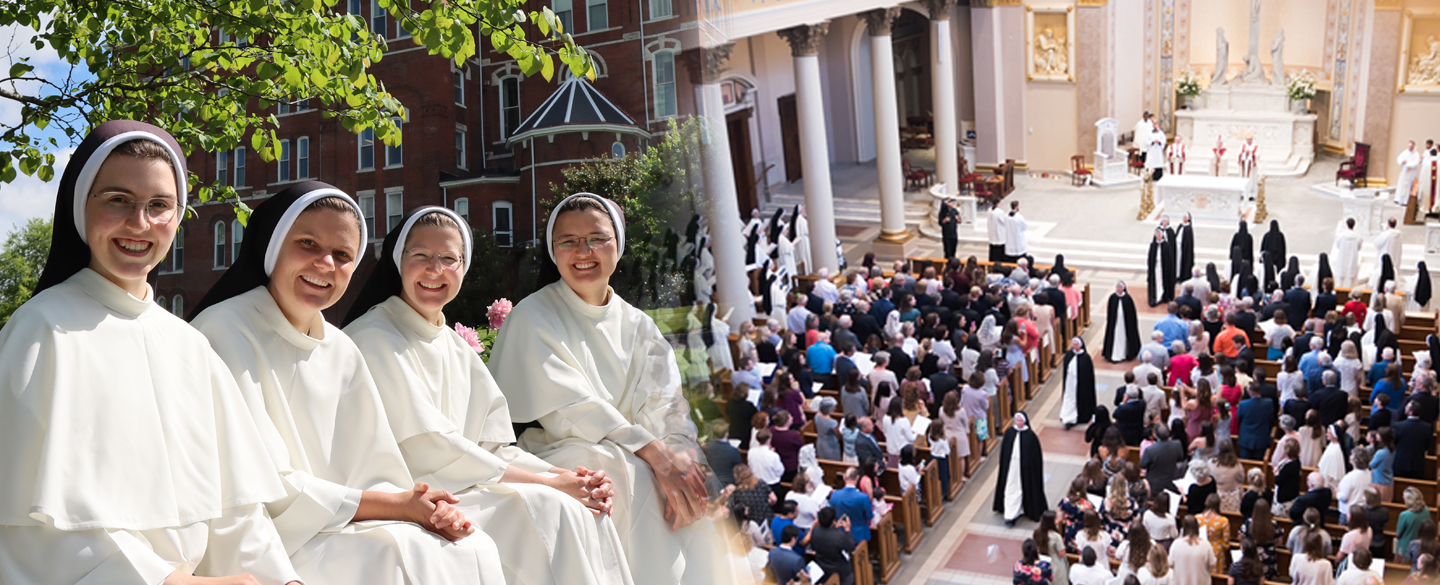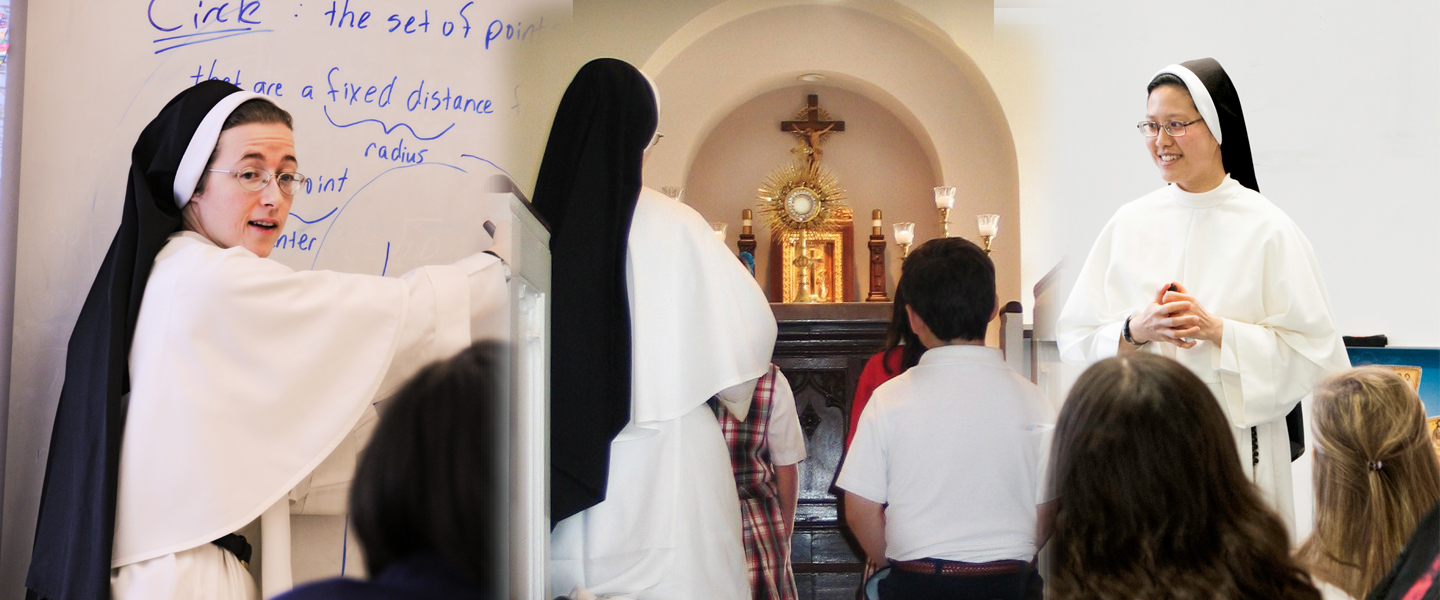
I ask you to consider whether you are being called to the consecrated life. ...How beautiful it is to see young people who embrace the call to dedicate themselves fully to Christ and to the service of his Church! Challenge yourselves, and with a pure heart do not be afraid of what God is asking of you! From your “yes” to the Lord’s call, you will become new seeds of hope in the Church and in society. Never forget: God’s will is our happiness! (Pope Francis, Message for the 30th World Youth Day)

Below we provide answers to questions about discernment and about our St. Cecilia Dominican life and community.
How do I know if I have a religious vocation?
What may start as an unsettling idea becomes a reoccurring thought. The person with a religious vocation increasingly finds that there is a restlessness of spirit that only the things of God seem to fill. Marriage may be attractive, but there is the question of whether or not God has something more in mind. A few questions to consider include:
- Are you happy, yet find that deep within you there is an unfulfilled longing? With all that you have is there is a sense that it is not enough?
- Do you feel drawn to daily Mass and more prayer than your present schedule permits?
- Do you enjoy sharing your faith with others, most especially those who are searching for God?
- When you first considered religious life, did the idea catch you off guard-like someone who has been picked out of a crowd and responds, “Who me?”
- Do you find that you possess a great love for the Church and her teachings?
- When you have contact with priests and religious, is there a sense of connection, an attraction to the joy and conviction they possess?
If you answered affirmatively to the above, you will want to consider the next question.
What can I do to discern God’s call more deeply?
The best answer to this question is to pray, pray and pray some more. God speaks to us in the silence of our hearts. We can look for extraordinary signs, but God works best with our cooperation in prayer and honest investigation. The closer you move toward the light, the easier it will be to see the road. Make a plan for your spiritual life and include the following:
- Examine your conscience daily and seek to know yourself better in the light of God’s love and mercy.
- Go at least monthly to the Sacrament of Penance.
- If you have access to a good spiritual director who understands religious life and has the wisdom to guide you, then let such help benefit you.
- Attend Mass daily, if possible.
- If you have a Blessed Sacrament Chapel with Eucharistic Adoration nearby, then set aside time in Christ’s presence. If not, try to visit a Church and give at least an hour or so a week for silent prayer before the Blessed Sacrament.
- Read Scripture daily and look to Catholic classics to learn about the great founders of religious orders and the saints who followed them.
- Participate in retreats, preferably at convents. Some Orders offer vocation discernment experiences, while others provide in-depth opportunities for prayer. Either way, there is much to be learned from such exposure and attention to your spiritual life.
- Talk to a sister. Having experienced what you are going through, she will understand whatever apprehensions or concerns you may have. Learn as much as you can about the way the life is lived.
- If you have taken initial steps, liked what you have read about a congregation, and have been encouraged by the vocation director, then plan a weekend visit.
What are some of the basic requirements for acceptance into this Community?
Below are listed some prerequisites for consideration as a candidate for entrance:
- Sufficient health
- Emotional wholeness
- The ability to live happily within community
- Sufficient age and maturity
- A proper motive
- Each applicant is reviewed individually. Minimally, one must be a high school graduate. Our stated age limit is 30 years of age. Exceptions, while not frequent, can be made.
What if I am not a teacher?
Very few people come to us as “ready made” teachers. While some already have a college degree, most need certification and training in what it means to be a “Dominican” teacher. Our young sisters attend our own Aquinas College and are educated not only to be teachers but are formed in the Dominican tradition of study and the pursuit of truth. This allows the sister to apply what she has gained by study into the teaching apostolate.
The question to ask is, do I enjoy people and could I pour out my love for Christ in the context of a classroom? What is needed is zeal for Christ and generosity. Religious life is not a career; it is a way of loving.
Speaking of education, my parents are worried that if I do not finish college first, I won’t be well educated.
To be Dominican is to spend our life in study. We take seriously Dominic’s insistence that those in his Order should be given the best in education. By possessing sound knowledge of the truth, the religious is able to share that truth. Our sisters are prepared for the apostolate with an initial program of studies that provides them with exposure to both sacred and secular subjects. The sisters continue their studies to pursue Masters Degrees in theology and in secular subjects for the apostolate with an initial program of studies that provides them with exposure to both sacred and secular subjects (History, Administration, Philosophy, English, Music or other fields that will best prepare them to serve the community and the Church). As teachers and Dominicans, we cultivate a love for study both for its own sake, and for the sake of the good of souls.
I can’t sing well! Is that an impediment?
People come to us with a variety of gifts and talents. Singing doesn’t have to be one of them. While it is true that we highly value the enhancement that beautiful music brings to the liturgy and our communal prayer of the Divine Office, quality of voice and musical ability is not necessary.
What is the best age to enter?
The best age to enter is when God calls. The greatest impetus comes when God’s grace makes us “ready.” For some this call comes around the age of 23 or 24, while for others He surprises the world and calls a young woman at the age of 18. Occasionally circumstances are such that an individual has not considered the religious life until the age of 28 or 29. Whatever the case, God’s call is mysterious. What is most important is not full maturity but deep self-knowledge. If someone knows herself and has prayerfully considered religious life in its essentials, she may possess a sincere and well-informed desire. This is God’s gift. When discussing the idea with friends and family it is important that it be seen not as a career choice but as a call from God.
I find that I am attracted to both religious life and marriage. Does the fact that I would love to be married and have a family mean that I don’t have a religious vocation?
No, this simply means that you are normal! Some of the same qualities needed to be a good wife and mother are needed to be a good religious. We love with the same capacity though the expressions differ. As religious, we know Christ as our Spouse and express our intimacy with Him in a life of prayer. We seek to give birth to Christ spiritually in the children we teach. When engaging whole-heartedly our feminine gifts, these expressions of sacrificial love are life-giving and tremendously fulfilling.
What about dating and discernment?
Because the call to religious life is an invitation to freely follow Christ and choose Him as Spouse, dating in the midst of discernment often only throws shadows on how to proceed. The call to religious life, like that of marriage, is a radical call to surrender oneself wholly to the other. In the case of religious life, this surrender is to Christ alone in the totality of our self-gift. Because all of our loves are ordered in and through Christ, we can lose nothing by setting dating aside for a time to allow Christ to speak to our hearts and direct the love He has first given to us.
What is your relationship with your family after entering the convent? Can you visit with them?
As a sister grows nearer to Christ in her days of formation, her love for her family deepens. The visits they have together and the letters they send become precious opportunities to share with one another on a deeper spiritual level. We have a great debt of gratitude for our families since it is from them that we have been given life, love and the gift of our faith. With time and the power of God’s grace our relationships actually grow stronger. The hundredfold promised to those who leave everything to follow Christ also flows into our families.
At the beginning of formation, the sisters have scheduled visiting days 3-4 times each year when their families come and see them at the Motherhouse. In May of the postulant year, the sister may go home at a designated time for a visit of 7 days. Four years after the postulant home visit, the sister may go home for a week each year. These visits become special opportunities for the sister and her family, a time that is treasured by all.
These regulations are based on solid religious practice that has shown itself to be effective through years of lived experience within the Church and specifically within our Congregation. They are intended to make our relationship with Christ the most primary one in our life. All others are to flow from that one source.
What about the sacrifice of giving up all the good things of the world?
The grace of a religious vocation is to respond to God’s call to leave all things to follow Christ (see Matthew 19:21). This entails sacrifice. Yet this sacrifice, joined with Christ, brings great joy.
Frequently, people leave out the fact that a call to the religious life is an invitation to look beyond the things of this world in all of their goodness, in favor of the ultimate realities of heaven. Through the vow of poverty, Christ detaches us from possessions so that we may have full freedom to possess supernatural realities. Through the vow of chastity, He frees us for single-hearted devotion to Christ as our Spouse. Through the vow of obedience, He conforms our wills totally to His. In this way, we anticipate heaven where all will live, in effect, as those consecrated to Christ.


 Back
Back